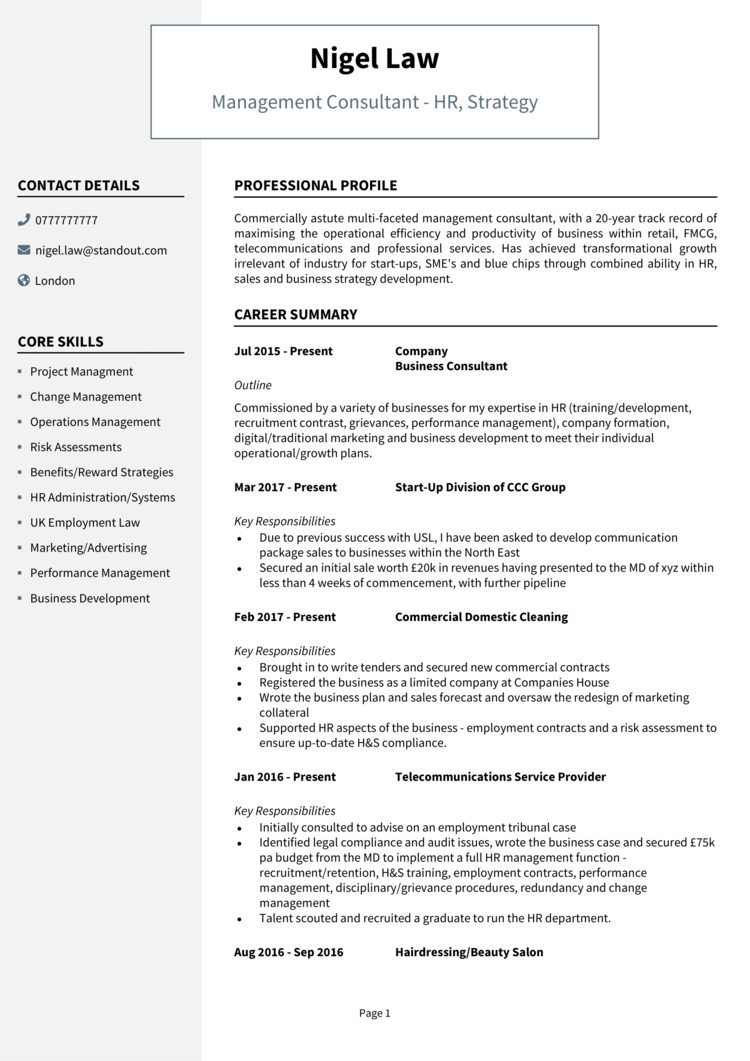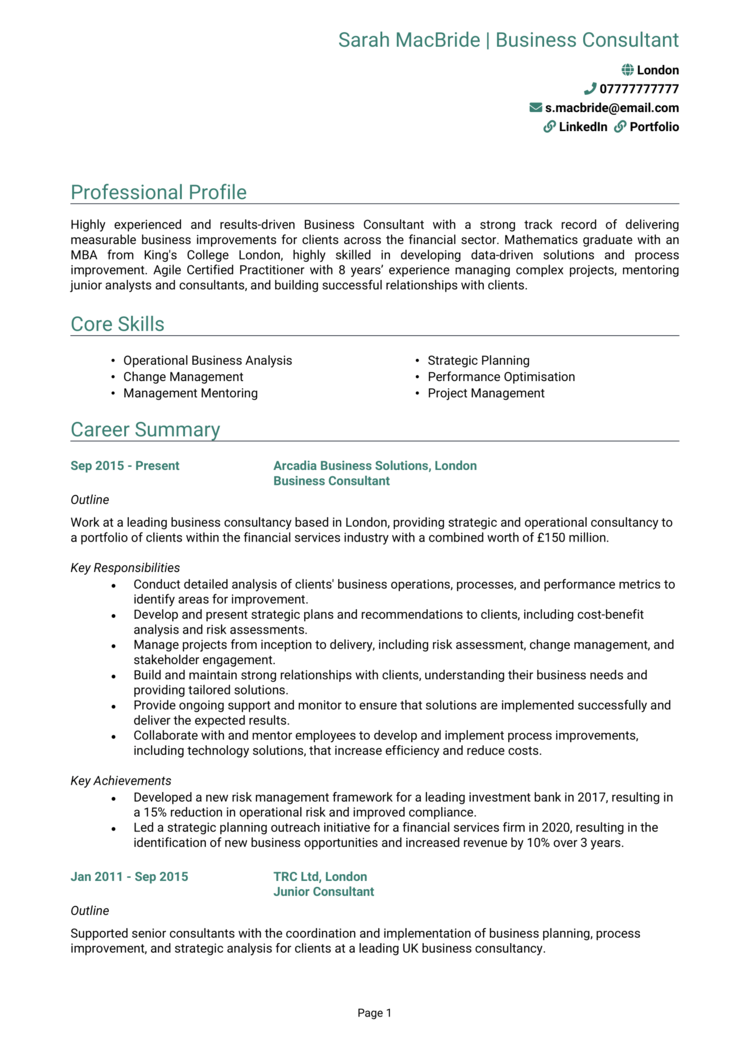If you’re ready to help businesses thrive, then management consulting could be the perfect fit for you. It’s a lucrative and rewarding role, where you’ll get to solve problems that even bosses can’t figure out.
But first, you need a CV that shows you can tackle the toughest challenges. This guide, complete with 4 Management Consultant CV examples, will help you highlight your analytical skills, strategic mindset, and above all else the ability to land high-impact interviews – and ultimately, the top jobs in consulting.
Management Consultant CV

Business Consultant CV

Independent Consultant CV

Strategy Consultant CV

How to write your Management Consultant CV
Learn how to create your own interview-winning Management Consultant CV with this simple step-by-step guide.
A Management Consultant CV needs to prove you’ve got the skills to analyse problems, devise actionable strategies, and deliver results that make businesses better.
These steps will teach you the best way of writing a CV that showcases your expertise, drives interest from consulting firms, and gets you one step closer to landing your dream role.
How to create a good structure for your Management Consultant CV


Think of your CV structure like one of your PowerPoint decks – clean, clear, and packed with the key points that’ll make the audience (a recruiter) nod along enthusiastically. Consulting recruiters need to see the essentials quickly, so a clean layout is crucial.
Here’s how to structure your Management Consultant CV:
- Name and personal information – Contact details sit prominently at the top for immediate accessibility to prospective employers. Including a professional picture of yourself is entirely optional.
- Profile – Open with a compelling summary of your consulting experience, skills, and achievements.
- Core skills – Next, highlight your expertise in areas like data analysis, project management, and stakeholder engagement.
- Work experience – List your consulting roles and relevant experience in your CV in reverse chronological order.
- Education – Go through your academic background and any certifications relevant to management consulting.
- Additional info – Use this optional space to outline any hobbies and interests that show leadership, analytical thinking, or global awareness.
Management Consultant CV format


Your CV format should reflect the clarity and professionalism you bring to consulting engagements. A clean design ensures your qualifications stand out without unnecessary distractions or mistakes.
Here’s how to format your CV effectively:
- Bullet points – Break information into snappy, impactful points that are easy to skim through.
- Divide sections – Use bold headings and consistent spacing to make your CV easy on the eye and even easier to navigate.
- Use a clean font – Choose a professional, easily readable font that reflects your polished style.
- Keep it the right length – Stick to a two-page length limit to highlight your key achievements without unnecessary extras.
Writing a Management Consultant CV profile


Your CV profile is your elevator pitch, except this elevator is zooming straight to the top floor of a Fortune 500 headquarters. Make it count. It should immediately communicate why you’re a standout candidate for consulting roles, and the benefits you’d bring to any company that hires you.
Management Consultant CV profile examples
Profile 1
Experienced Management Consultant with six years of experience advising Fortune 500 companies on operational efficiency and organisational transformation. Proficient in conducting data analysis, developing strategic plans, and delivering measurable outcomes, including a 20 percent reduction in operating costs for major clients.
Profile 2
Dedicated Management Consultant with four years of experience in financial services, specialising in process improvement and regulatory compliance. Skilled in stakeholder management, conducting workshops, and delivering actionable recommendations that improve efficiency and minimise risk.
Profile 3
Proficient Management Consultant with over eight years of expertise in advising SMEs and startups on growth strategies and market entry. Skilled in data-driven decision-making, business model optimisation, and leading cross-functional teams to achieve a 30 percent increase in revenue for key clients.
What to include in your Management Consultant CV profile
Here are some tips on what to put in your Management Consultant CV profile:
- Where you’ve worked – Mention the sorts of industries or companies you’ve consulted for, especially those relevant to the role.
- Your top qualifications – Be sure to highlight the degrees, MBAs, or certifications like CMC or Lean Six Sigma.
- Strategic expertise – Tell the recruiter which areas of consulting you excel in, such as cost reduction or operational improvement.
- Results you’ve delivered – Quickly mention any significant outcomes, such as improved efficiency or cost savings.
- Stakeholders you’ve worked with – Include high-level clients or cross-functional teams you’ve collaborated with.
How to present your core skills section properly


Your CV skills section is like your consulting toolbox – whether you’re cutting inefficiencies or building up a growth strategy, these are the skills that make it happen. An especially good CV will tailor this section to reflect the priorities of the firm you’re applying to, and focus on the tangible abilities you’ve got to get the job done right.
Top skills for your Management Consultant CV
- Strategic Planning – Developing actionable strategies to improve organisational performance and achieve business goals.
- Business Process Analysis – Mapping and analysing workflows to identify inefficiencies and recommend optimised solutions.
- Financial Modelling – Creating detailed financial models to forecast outcomes, assess investments, and support decision-making.
- Data-Driven Decision Making – Leveraging advanced analytics to inform recommendations and validate proposed solutions.
- Stakeholder Engagement – Building strong relationships with key stakeholders to ensure alignment and support for initiatives.
- Organisational Change Management – Guiding businesses through structural, cultural, or operational changes for smooth transitions.
- Market Entry Analysis – Evaluating opportunities and risks for businesses entering new markets or launching new products.
- Project Management – Overseeing project timelines, resources, and deliverables to ensure successful implementation of recommendations.
- Benchmarking – Conducting comparative analysis to measure performance against industry standards and competitors.
- Risk Assessment – Identifying and mitigating potential risks associated with business strategies or operational changes.
Work experience


Your work experience section is where you show how you’ve applied your consulting expertise to solve problems and deliver results. Recruiters prefer candidates with provable real-world experience, so go into depth on your most relevant roles.
Formatting your job history for your CV

- Outline – Briefly describe the organisation, your role, and the scope of your consulting work.
- Responsibilities – Highlight key tasks, such as analysing data, developing strategies, and presenting findings.
- Achievements – Include measurable outcomes, like revenue growth, cost savings, or improved performance. Use numbers wherever possible.
Example job entries for a Management Consultant CV
Management Consultant | Strategix Advisory Group
Outline
Advised clients in the retail and manufacturing sectors on operational improvement and cost-saving initiatives. Delivered tailored solutions that aligned with client goals and industry best practices.
Responsibilities
- Conducted in-depth analysis of supply chain processes to identify inefficiencies and recommend improvements.
- Developed strategic plans that reduced operational costs by up to 15 percent.
- Facilitated workshops with client teams to align goals and implement new processes.
- Prepared detailed reports and presentations for C-level executives.
- Managed project timelines and budgets, ensuring successful delivery within scope.
Achievements
- Achieved £1M in annual savings for a client through streamlined procurement processes.
- Improved delivery times by 20 percent for a manufacturing client through supply chain optimisation.
- Recognised by clients for delivering actionable insights that drove measurable results.
Management Consultant | FinEdge Solutions
Outline
Worked with financial institutions to enhance regulatory compliance, streamline operations, and improve customer service delivery. Collaborated with cross-functional teams to design and implement effective solutions.
Responsibilities
- Performed gap analyses to identify areas of non-compliance and recommended corrective actions.
- Developed operational frameworks to enhance efficiency in client-facing processes.
- Led stakeholder workshops to gather insights and build consensus on proposed changes.
- Produced detailed compliance reports to ensure alignment with regulatory standards.
- Provided training for staff on new systems and compliance protocols.
Achievements
- Reduced non-compliance incidents by 30 percent for a leading UK bank.
- Improved customer satisfaction scores by 15 percent through redesigned service workflows.
- Delivered a £500K cost-saving initiative by automating manual reporting processes.
Management Consultant | GrowthPath Consulting
Outline
Provided strategic advice to startups and SMEs in the technology sector, focusing on scaling operations and entering new markets. Delivered tailored business solutions to achieve growth objectives.
Responsibilities
- Conducted market research and competitive analysis to identify growth opportunities.
- Developed go-to-market strategies for clients entering new regions.
- Designed scalable business models and operational frameworks to support growth.
- Facilitated strategy sessions with leadership teams to align on business goals.
- Prepared financial projections and business cases to secure funding from investors.
Achievements
- Increased client revenue by 30 percent through optimised pricing strategies and new market entry.
- Secured £2M in venture funding for a startup client with a comprehensive business plan.
- Recognised for delivering innovative solutions that enhanced client scalability and profitability.
Education section


The education section is vital for demonstrating your academic foundation in business or a related field. It should be a shorter section, as a recruiter values work experience, but it’s still important.
Include degrees, institutions, graduation dates, and certifications. If applicable, mention high achievements like honours or awards.
Always list qualifications in reverse chronological order, starting with the most recent.
Best qualifications for Management Consultants
- Master of Business Administration (MBA) – Advanced business training, often essential for top consulting firms.
- Certified Management Consultant (CMC) – Demonstrates expertise and credibility in management consulting.
- Lean Six Sigma Certification – Highlights process improvement and operational efficiency skills.
- PRINCE2 Certification – Focuses on project management methodologies.
- Chartered Financial Analyst (CFA) – Ideal for roles requiring financial expertise.





